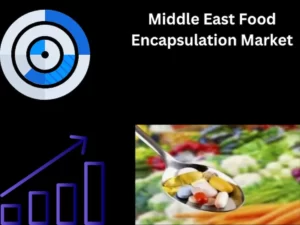© 2024 All rights reserved
Datavagyanik- Your Research Partner

The popularity of food encapsulation in the Middle East is growing due to its numerous benefits and advantages. Encapsulation is the process of enclosing food ingredients in small capsules to protect them from external factors such as moisture, oxygen, light, and temperature. Food goods’ shelf life is extended and their flavour, texture, and nutritional content are maintained. The controlled release of components is another benefit of the encapsulation method, which is useful for a variety of applications including flavour delivery, nutrition delivery, and controlled medication release.

Food encapsulation is becoming more and more crucial in the Middle East, where temperatures often soar, to guarantee the quality and safety of food goods. The food and beverage sector frequently uses encapsulation technology to improve the flavour, aroma, and texture of food products. The nutritional content of food is also increased by adding vitamins, minerals, and other healthy components.
Moreover, the growing demand for convenience foods in the Middle East is driving the popularity of food encapsulation. Encapsulated food products are easy to transport and store, and they can be quickly prepared and consumed, making them ideal for busy consumers. The encapsulation process also helps to reduce food waste by extending the shelf life of products, which is especially important in regions where food waste is a major concern.
The Middle East is home to a wide array of culinary delights, from the traditional dishes of countries like Jordan and Syria to the exotic flavours of North Africa.
Popular Middle Eastern dishes include hummus, falafel, shawarma, tabbouleh, baba ganoush, and kibbeh.
Middle Eastern cuisine is often characterized by its use of spices like cumin, coriander, cardamom, and turmeric.
Middle Eastern cuisine is often served with a variety of flatbreads like pita and lavash.
Saudi Arabia’s Saudi Food and Drug Authority (SFDA) has set regulations for food additives, including encapsulated flavours and ingredients.
In addition, governments in the Middle East are promoting the use of food encapsulation technology to support the food industry and enhance food security in the region. The governments are investing in research and development to create new and innovative encapsulation technologies, which will further drive the growth of the market in the coming years.
Food encapsulation is the technique of enclosing or entrapping food components in a protective barrier to improve their stability and usefulness, such as vitamins, minerals, flavours, and enzymes. Using a variety of methods, including microencapsulation, nanoencapsulation, hybrid technology, and microencapsulation, is part of the process. Due to several variables, food encapsulation is becoming more and more popular in the Middle East.
The capacity to extend the shelf life and stability of food products is one factor contributing to food encapsulation’s rising appeal in the Middle East. Ingredients that are encapsulated are shielded from environmental variables that might lead to degradation and decomposition, such as light, moisture, and oxidation. This is crucial in the Middle East as food decomposition can be accelerated by the hot, humid weather.
Another reason for the growing popularity of food encapsulation in the Middle East is its ability to enhance the functionality of food ingredients. Encapsulated ingredients can be designed to release slowly or rapidly, allowing for better control of flavour, colour, texture, and nutritional content. This is particularly important in the food industry, where the functionality of ingredients is critical to product development and consumer acceptance.
Food encapsulation technology is also adaptable because it may be used with a variety of food ingredients, including probiotics, prebiotics, essential oils, organic acids, enzymes, tastes, preservatives, and colours. For food producers aiming to enhance the nutritional and sensory qualities of their products, this makes it a helpful tool.
There are physical, chemical, and physicochemical approaches available for the process used to encapsulate food. Chemical approaches use coacervation and crosslinking chemicals, whereas physical methods use atomization, extrusion, and fluid bed processes. Physical and chemical processes are used in physicochemical approaches to envelop the substance being encapsulated in a barrier of protection.
Overall, the growing popularity of food encapsulation in the Middle East can be attributed to its ability to increase shelf life, enhance functionality, and improve the nutritional and sensory properties of food products.
The Food Encapsulation market in Saudi Arabia is growing due to several factors. First, the population of Saudi Arabia is increasing, and the government is encouraging citizens to pursue healthier diets. The use of food encapsulation technology helps to preserve the nutrients and flavour of food products, making them more appealing to consumers. Additionally, the Saudi government has enacted several initiatives to encourage the development of the food industry, such as providing incentives for local producers and encouraging investment from foreign companies. This has led to an increased demand for food encapsulation technology in the country.
The Food Encapsulation market in the United Arab Emirates is also growing due to many factors. First, the UAE is becoming a hub for food production, as the government is providing incentives to attract foreign investment. Additionally, the UAE is becoming an increasingly popular tourist destination, and this is driving up the demand for food products, including those that have been encapsulated. Furthermore, the UAE is home to several universities and research facilities that are conducting research into food encapsulation technology. This research is helping to make food encapsulation more efficient and cost-effective, which is furthering its adoption in the country.
The middle east Baby Care Products market has been segmented By Type, Core Phase and By Technology.
Based on the By Type, the middle east is Micro Encapsulation, Nano Encapsulation, Hybrid Technology, and Macro Encapsulation. In 2021, the Micro Encapsulation segment held a significant share. This trend is expected to continue throughout the forecast period owing to its ability to enhance product shelf life and reduce waste. The segment is also expected to benefit from increased demand for convenience foods due to consumer preferences shift. Additionally, its use in the medical and pharmaceutical fields is likely to drive segment growth. Furthermore, the growing use of microencapsulation in the personal care and cosmetics industries is anticipated to spur the segment’s growth over the forecast period. For instance, microencapsulation is used in the manufacture of sunscreen lotions and creams to enhance their efficacy and shelf life.
Based on the Core Phase, the market is classified as Vitamins [Fat Soluble Vitamins {Vitamin A, Vitamin D, Vitamin E, Vitamin K}, Water Soluble {Vitamin B Complex, Vitamin C}], Organic Acids [Citric Acid, Lactic Acid, Fumaric Acid, Malic Acid], Minerals, Enzymes, Flavors & Essences, Preservatives, Sweeteners, Colors, Probiotics, Prebiotics, Essential Oil. In 2021, the segment is expected to account for a significant share of vitamins & minerals. This is due to rising health consciousness among consumers, increasing demand for fortified foods, and the growing demand for dietary supplements. Furthermore, the rising prevalence of nutritional deficiencies and increasing awareness of the importance of vitamins and minerals for overall health is expected to drive demand for these products. As a result, companies are likely to invest significantly in the Vitamins & Minerals segment to capitalise on rising consumer demand and capitalise on future potential growth opportunities. For instance, Glanbia Nutritionals recently announced the addition of OmniMEGA Advanced Omega-3 Powder to its proprietary ingredient portfolio. This powder offers multiple advantages over standard fish and krill oils, such as enhanced shelf-stability and reduced sensitivity to air, heat, light, and humidity, as well as the ability to formulate into multi-ingredient tablets, capsules, melts, and powdered beverage applications.
Based on the By Technology, the middle east is a Physical Process [Atomization {Spray Drying, Spray Chilling, Spray disk}, Extrusion, Fluid bed technique], Chemical & Physicochemical Process. In 2021, the Physical Process segment held a significant share. Physical Process Encapsulation is a process in which substances are encapsulated in a protective shell or coating. This process protects the encapsulated materials from environmental factors, such as light, moisture, and oxygen, and helps to extend their shelf life. This is expected to drive the overall industrial process segment in the coming years. Furthermore, the demand for physical processes is expected to grow significantly due to their widespread applications across various end-use industries, such as automotive, construction, and aerospace, which are expected to propel the segment’s growth over the forecast period.
By Type
By Core Phase
By Type
By Region
“Every Organization is different and so are their requirements”- Datavagyanik







© 2024 All rights reserved
Datavagyanik- Your Research Partner
Add the power of Impeccable research, become a DV client